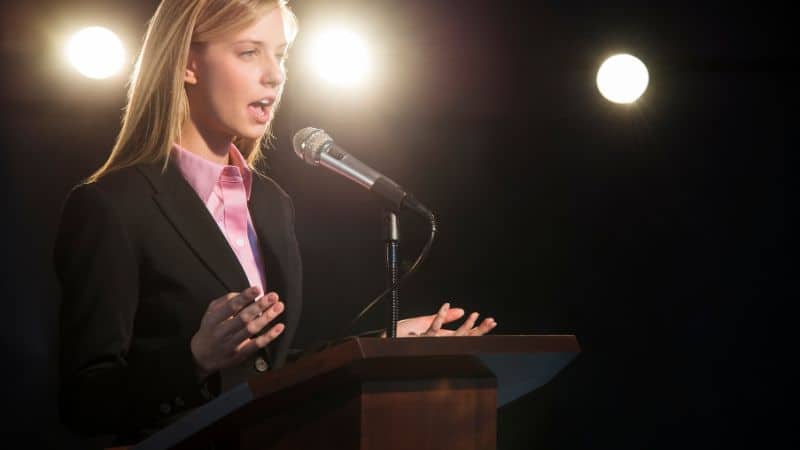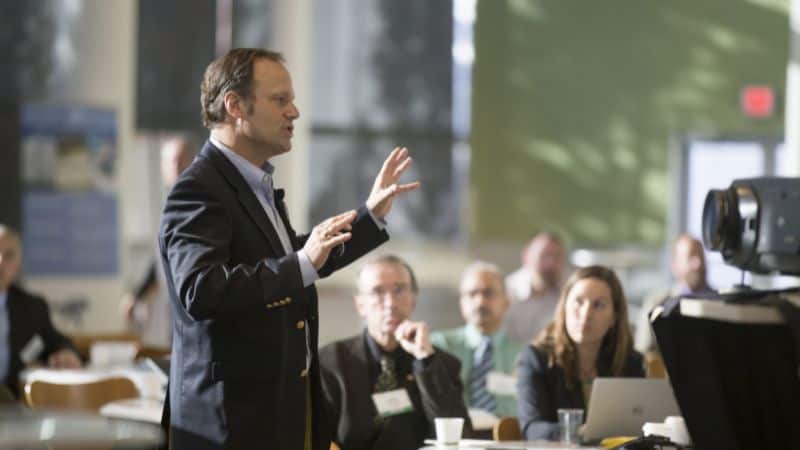A keynote speaker can be the game-changer, setting the right direction and tempo for an event. Like a skilled conductor, they orchestrate ideas, rhythm, and energy, turning an ordinary gathering into an extraordinary experience.
I will unfold this guide in two parts.
The first part is a compass for you, whether you’re aspiring to be a keynote speaker or seeking to understand this dynamic craft. I will offer practical wisdom and insights into the art of impactful speaking.
The second is a glimpse into my world – the themes that fuel my keynotes and how they resonate and inspire.
Let’s explore how the right words, at the right time, can transform an event and its audience.
What is a Keynote Speaker?
A keynote speaker is the star of the show at any event. They set the tone and theme, making sure everyone understands the main message of the event. Think of them as the big picture person who ties everything together.
Keynote Speaker vs. Other Speakers
- Guest Speakers: These are people invited to talk about specific topics. They add value but don’t connect with the event’s overall theme.
- Motivational Speakers: They inspire and energize. While their speeches can be uplifting, they might not always align with the event’s core message.
- Subject Matter Experts: These speakers know a lot about one thing. They provide detailed insights but might not have the broad appeal needed for a keynote.
- Panelists: They discuss and debate topics with other experts. Panels are interactive and informative but don’t provide the singular, focused message a keynote does.
Example: AI for Sustainable Development
Imagine you’re at a big conference about AI for sustainable development. The keynote speaker might start by sharing a powerful story about how AI is being used to solve real-world problems, like reducing waste in cities or improving farming methods to grow more food with less water.
They would then explain the big ideas behind using AI for sustainability, making it easy for everyone to understand why this topic matters. They would highlight how AI can make our world better and what we need to do to make this happen.
The keynote speaker would tie together all the different parts of the conference.
They might say, “Later today, you’ll hear from experts on how AI is helping farmers grow more food. You’ll also see demonstrations of new AI tools that can predict weather patterns to help communities prepare for natural disasters. And don’t miss the panel discussion on the ethical use of AI – it’s crucial to ensure we use this technology responsibly.”
By doing this, the keynote speaker makes sure everyone understands the main theme: AI for sustainable development. They get the audience excited and set the stage for the other speakers.

Why the Keynote Matters
The keynote speaker is special because they bring everything together. They create a narrative that everyone can connect with, making the event memorable and impactful. They help the audience see the big picture and understand how all the pieces fit together.
In a conference about AI for sustainable development, the keynote speaker would help everyone see the potential of AI to make our world a better place. They would inspire the audience to think big and act on the ideas presented throughout the event.
The Unique Value of a Keynote Speaker
A keynote speaker brings unique value to your event. They set the stage, inspire the audience, and tie everything together.
Set the Tone and Theme
The keynote speaker kicks off the event with a powerful message. For example, at a conference on AI for sustainable development, they might open with a story about how AI is transforming a community by reducing waste and saving resources. This sets the tone, making everyone excited about the possibilities of AI.
Engage the Audience
A good keynote speaker knows how to capture attention. They use stories, examples, and sometimes humor to keep everyone engaged. At our AI conference, the keynote speaker might show videos or share real-life examples of AI solving environmental problems. This makes the topic come alive and keeps the audience interested.
Inspire Action
Keynote speakers don’t just inform; they inspire. They make the audience feel like they can be part of something big. At the AI conference, the keynote speaker might challenge the audience to think about how they can use AI in their own work to make a positive impact on the environment. They leave the audience feeling motivated and ready to take action.
Connect the Dots
A keynote speaker helps the audience understand how all the pieces of the event fit together. They might say, “You’ll hear from experts about the latest AI technologies, and you’ll see how these technologies are being used in real-world applications. Our panel on ethical AI will help you think about the responsibilities that come with this powerful technology.”
This helps the audience see the big picture. They understand how each session and speaker contributes to the overall theme of AI for sustainable development.
Make the Event Memorable
A keynote speaker leaves a lasting impression. They might end with a powerful quote or a call to action that resonates with everyone. This helps the audience remember the key message and feel connected to the event’s goals.

Common Misconceptions about Keynote Speaking
There are several misconceptions about keynote speaking that can lead to confusion. Let’s clear them up.
Misconception 1: Keynote Speakers and Motivational Speakers are the Same
While both can be inspiring, their roles are different.
A keynote speaker sets the overall theme and tone of the event. They provide a broad, engaging message that aligns with the event’s goals.
A motivational speaker, on the other hand, focuses on inspiring and energizing the audience, often with personal stories and high-energy delivery.
The keynote speaker might inspire too, but their primary role is to connect the event’s purpose with the audience.
Misconception 2: Any Good Public Speaker Can Be a Keynote Speaker
Not all public speakers can deliver an effective keynote. Keynote speakers need to understand the event’s theme deeply and weave their message around it. They must be able to engage a diverse audience and provide insights that resonate with everyone.
It’s not just about speaking well; it’s about crafting a message that ties everything together and leaves a lasting impact.
Misconception 3: Keynote Speakers Are Only for Large Events
Keynote speakers add value to events of all sizes. Whether it’s a small company meeting or a large international conference, a keynote speaker can set the tone and inspire the audience.
They bring a level of professionalism and coherence that can elevate any event, making it more memorable and impactful.
Misconception 4: The Keynote Speech is Just an Introductory Talk
A keynote speech is much more than an introduction.
It’s the anchor of the event. The keynote speaker sets the stage for what’s to come, providing a framework that the rest of the event builds on.
They connect the dots, ensuring the audience understands the big picture and the event’s purpose.
Example: AI for Sustainable Development
Let’s revisit our AI for sustainable development conference. The keynote speaker might start by sharing a compelling story about AI’s impact on reducing waste. They then explain the broader implications, setting the stage for other speakers to delve into specific aspects like ethical AI, technological advancements, and real-world applications.
This isn’t just an introduction; it’s a comprehensive, engaging narrative that ties everything together.
How to Find the Extraordinary Keynote Speaker
Finding the perfect keynote speaker for your event can make all the difference. It might seem daunting, but following a clear process can simplify it.
Here are six steps to help you find an extraordinary keynote speaker.
Let’s dive into the first three steps using a conference on Extraordinary Public Service as our example.
Step 1: Identify Your Event Goals and Audience
First, understand what you want to achieve with your event. Are you aiming to inspire, educate, or motivate your audience?
For a conference on Extraordinary Public Service, your goal might be to highlight innovative ways public servants are making a difference and to inspire others to follow suit.
Next, think about your audience. Who are they? What are their interests and expectations? In this case, your audience might be public servants, government officials, and community leaders. They are likely looking for practical insights, inspiring stories, and actionable takeaways.
Example: You want the keynote speaker to set the stage by showcasing groundbreaking public service initiatives and energizing the audience to think creatively about their roles. Knowing this helps you look for a speaker who has experience in public service and can deliver an inspiring message.
Step 2: Define the Qualities of an Ideal Keynote Speaker
Once you know your goals and audience, outline the qualities your ideal speaker should have. What kind of experience and expertise do they need? Should they be an engaging storyteller? Do they need to adapt their message to different audiences?
For the Extraordinary Public Service conference, you might look for a speaker who has:
- Extensive experience in public service.
- A track record of innovative projects.
- Engaging storytelling skills.
- The ability to connect with and inspire a diverse audience.
Example: You could seek someone like a former mayor known for transforming their city through innovative public policies, or a community leader who led a successful grassroots movement. Their real-world experience and storytelling ability will resonate with your audience.
Step 3: Research and Shortlist Potential Speakers
Now, start researching potential speakers. Look for recommendations, check speaker bureaus, and watch videos of their past speeches. Pay attention to their style and substance to ensure they align with your event’s goals.
Example: You might find several candidates: a well-known public service advocate, a former government official, and an author who writes about public service innovation. Create a shortlist of speakers who not only have the right experience but also demonstrate the ability to engage and inspire an audience.
As you research, consider:
- Recommendations from colleagues or industry professionals.
- Reviews and testimonials from past events.
- Online videos of their keynote speeches to gauge their style and effectiveness.
By following these first three steps, you’ll have a solid foundation for finding the right keynote speaker for your event.
Step 4: Evaluate Their Speaking Style and Content
Once you have a shortlist, dive deeper into evaluating each speaker’s style and content. Watch their videos, read their blogs or books, and look at their social media presence. You want to ensure their message and delivery style align with your event’s goals.
Example: For the Extraordinary Public Service conference, you might find that one speaker excels at using personal stories to highlight public service achievements, while another focuses on data-driven presentations. If your goal is to inspire and motivate, the storyteller might be a better fit. However, if you want to provide concrete, actionable insights, the data-driven speaker might be ideal.
As you evaluate, consider:
- Their ability to engage the audience and keep their attention.
- How they structure their talks and the clarity of their message.
- Whether they can adapt their content to fit the theme of your event.
Step 5: Consider Logistics and Budget
Now, it’s time to think about the practical aspects. Check the availability of your preferred speakers and ensure they fit within your budget. Don’t forget to account for additional costs like travel, accommodation, and any special requirements they might have.
Example: You’ve narrowed down your list to three potential keynote speakers for the Extraordinary Public Service conference. You contact their agents to inquire about their availability and fees. One speaker is available but exceeds your budget significantly, while the other two are within your budget but have different travel requirements. Weigh these factors carefully to make a decision that balances cost and convenience.
Key points to consider:
- Speaker fees and what they include.
- Travel and accommodation costs.
- Any additional expenses such as special equipment or materials they might need.
Step 6: Conduct an Interview or Meeting
Finally, arrange a meeting or interview with your top choices. This gives you a chance to discuss your event in detail, clarify your expectations, and see how enthusiastic they are about your event.
Example: You set up meetings with the two speakers who fit your budget for the Extraordinary Public Service conference. During these meetings, you discuss the event’s goals, audience, and key themes. You also gauge their enthusiasm and willingness to tailor their speech to fit your event. One speaker stands out with their proactive approach and creative ideas for engaging the audience, helping you make your final decision.
During the interview, consider asking:
- How they plan to tailor their message to fit your event.
- Examples of how they’ve engaged similar audiences in the past.
- Any special requirements they have to deliver their best performance.
For your conference on Extraordinary Public Service, this process will help you find a speaker who can inspire, engage, and leave a lasting impact on your audience, ensuring your event is a resounding success.
Making the Final Decision
After you’ve done all the legwork—understanding your goals, defining the ideal speaker, researching and shortlisting, evaluating, and interviewing—it’s time to make the final decision.
This step is crucial as it can make or break your event. Here’s how to make the best choice:
Compare Shortlisted Speakers
Review the information you’ve gathered on each candidate. Look at their strengths and weaknesses in the context of your event goals. Consider their speaking style, content relevance, audience engagement, and logistical fit.
Example: For the Extraordinary Public Service conference, you might have three top candidates: a former mayor known for innovative policies, a community leader with inspiring grassroots success stories, and a public service advocate with a strong data-driven approach. Each brings something unique, so weigh these qualities against your event’s objectives.
Seek Feedback from Colleagues or Event Committee Members
Gather opinions from others involved in organizing the event. They might provide insights you hadn’t considered and help you see things from different perspectives. This collaborative approach ensures that the final decision is well-rounded and considers various viewpoints.
Example: You discuss the top candidates with your event planning team. One member highlights the former mayor’s ability to connect with policy makers, while another appreciates the community leader’s relatable stories. This feedback helps you see which speaker might resonate best with your specific audience.
Make an Informed Choice Based on Alignment with Event Goals and Audience Needs
With all the information and feedback at hand, decide on the speaker who best aligns with your event goals and audience expectations. Trust your research and intuition to choose someone who will set the right tone and leave a lasting impact.
Example: After careful consideration, you choose the community leader for the Extraordinary Public Service conference. Their ability to inspire and connect with a diverse audience aligns perfectly with your goal of motivating attendees to think creatively and act on innovative public service ideas.
Finalize the Engagement
Once you’ve made your decision, finalize the engagement by signing a contract and discussing the next steps. Ensure all logistical details are clear, and provide the speaker with all the information they need to tailor their presentation to your event.
Example: You reach out to the community leader to confirm their participation. You discuss the event schedule, provide details about the audience, and share your event goals. This helps the speaker prepare a customized and impactful keynote speech.
For your conference on Extraordinary Public Service, choosing the right speaker ensures that the event is not only successful but also memorable and inspiring.

Public Speaking Articles
Finding the right keynote speaker can transform your event from ordinary to extraordinary. A great keynote sets the tone, engages the audience, and connects the event’s theme with compelling stories and insights. Don’t settle for just any speaker; look for someone who understands your goals and resonates with your audience.
Start by identifying what you want to achieve and who your audience is. Define the qualities that make an ideal speaker for your event. Research and shortlist candidates who have the right experience and style. Evaluate their speaking content and ensure they fit within your budget and logistical needs.
A good keynote speaker is more than just a good public speaker. They inspire action, connect the dots, and make your event memorable. Conduct interviews to find someone who is enthusiastic and ready to tailor their message to your audience.
Making the final decision requires comparing your shortlisted candidates and seeking feedback from colleagues. Choose the one who best aligns with your goals and audience needs, ensuring a lasting impact.
Consider the articles that follow for a deeper dive into each step of finding an extraordinary keynote speaker. These insights will guide you through the process, helping you create an unforgettable event.
Jef Menguin
Jef Menguin is a professional speaker who helps leaders and teams achieve outstanding results. With over 20 years of experience, Jef has inspired thousands through his engaging workshops and keynote speeches. His approach is simple yet powerful, focusing on practical strategies that can be applied immediately.
Jef’s sessions are known for their energy and interactive elements. He doesn’t just talk; he involves everyone, making sure participants leave with clear action plans. Whether it’s leadership, team building, or personal development, Jef covers it all with passion and expertise.
Companies trust Jef because he delivers results. He has worked with top organizations, helping them transform their cultures and boost performance. His methods are proven, and his insights are fresh and relevant to today’s challenges.
Jef believes in the power of storytelling. He shares real-life examples that resonate with his audience, making complex concepts easy to understand. His style is relatable and down-to-earth, ensuring everyone feels included and motivated.
Choosing Jef Menguin means investing in real change. He is committed to helping individuals and teams grow, succeed, and reach their highest potential. If you want a speaker who truly makes a difference, Jef is the perfect choice.






